Quanthem/iStock/GettyImages
Although sugar is a vegetable product, made from sugar cane or sugar beets, it's processed in such a way that it's almost impervious to bacterial growth. Unlike most of the foods in your kitchen, it doesn't need to be refrigerated or frozen. Keep one small container of sugar accessible in your refrigerator and store larger quantities in a food-safe plastic container in a basement or pantry.
Problems With Freezing
Although freezing is ideal for preserving many foods, it's not the best choice for granulated sugar. Sugar easily picks up off-odors that might be present in other frozen foods and can develop a musty taste. It also becomes lumpy if exposed to even a little moisture, another reason you shouldn't store it in the refrigerator either. Chances are, if you're like most cooks, you have limited freezer space. Don't waste this precious space on sugar -- save it for perishable foods, such as meats, grated cheese and breads.
How to Store Sugar
The best way to store sugar is in air-tight, lidded containers, such as food-grade plastic bins, glass jars or polyester film bags. Air, heat, moisture and light are the enemies when it comes to dry food storage, so store sugar in a cool, dry, dark pantry. Properly stored, sugar lasts indefinitely because bacteria doesn't grow in it. However, try to use it within two years for best quality. If you live in a hot, humid climate, use it within one year.
Lumps and Clumps
Even with careful storage, sugar may harden or develop lumps, especially if the weather is humid. To deal with moisture in the sugar, heat the oven at its lowest temperature. Place the sugar in an oven-safe bowl and bake it for 10 to 15 minutes, or until it breaks apart when touched. Turn off the oven and leave the sugar in the oven for one hour. Pulverize lumpy sugar in a food processor before repacking it.
Throw It Out
Sugar, by itself, is unlikely to mold or spoil when properly stored, but it may spoil if it's been contaminated with other foods. Always use a clean measuring cup when scooping sugar out of a container to avoid mixing it with perishable ingredients. If the sugar shows signs of mold or has an off odor or flavor, discard it, rather than risking illness.
Related Articles

How to Make Sugar Wax?
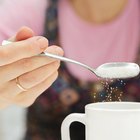
How to Substitute Splenda for Sugar
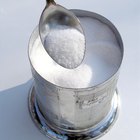
How to Keep Sugar From Clumping

How to Get Tub Frosting to Harden

Hair Removal Wax Recipe
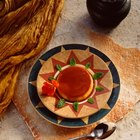
How to Melt White Sugar for Flan
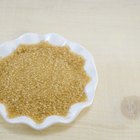
How to Remove Blackheads Using Sugar

Does Cream-Based Frosting Have to Be ...

How to Make Liquid Sugar Concentrate
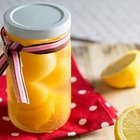
How to Freeze Apricots
How to Soften Crystalized Molasses

Can You Color Boiled Icing?

How to Bake Sugar Free Cheese Cake

Difference in Sugar Content of Sweet ...
Can You Make Candy Using Honey Instead ...

How to Prevent Fabric Dry Rot
How Long Can Honey Last Without Going ...

How to Freeze Raspberries
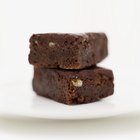
Can You Make Brownies Without ...

How to Make a Sugar Mask for Your Face
References
Writer Bio
Julie Christensen is a food writer, caterer, and mom-chef. She's the creator of MarmaladeMom.org, dedicated to family fun and delicious food, and released a book titled "More Than Pot Roast: Fast, Fresh Slow Cooker Recipes."